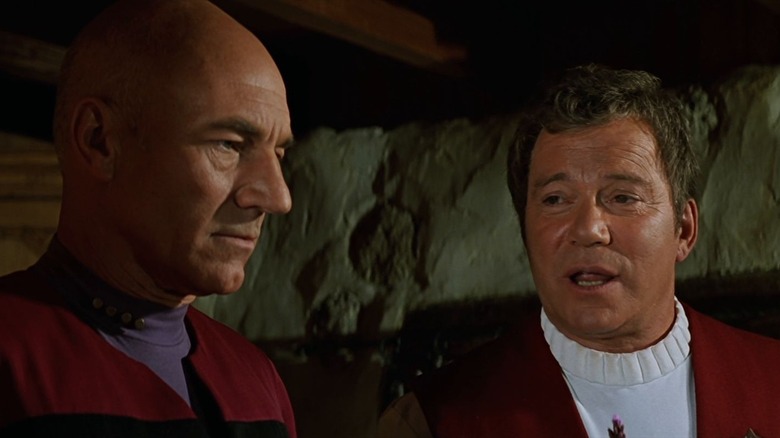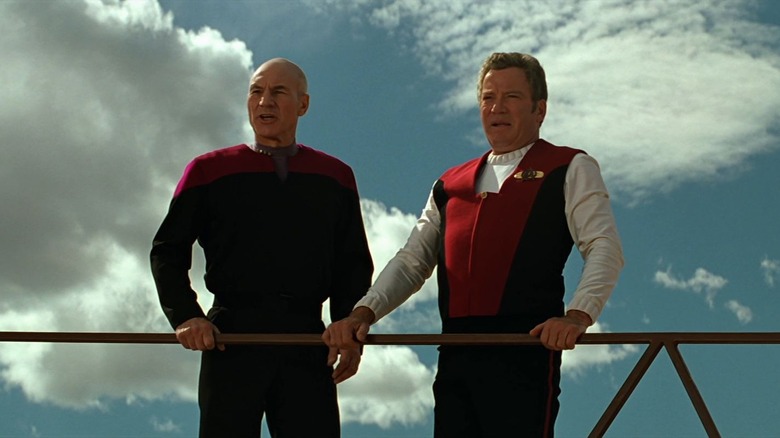William Shatner Learned A Valuable Lesson About Star Trek From Patrick Stewart
William Shatner has admitted to feeling ambivalent about "Star Trek." On the one hand, it brought him a great deal of fame. He was a studious and hard-nosed practitioner of his craft who always longed to be a leading man. He saw "Star Trek" as his show and was happy to be in the spotlight for it. Shatner's ego was large (as his co-stars have happily pointed out), but he took his job seriously. When the show was canceled, Shatner seemed all too happy to put it behind him and move on to other projects. Then the series became a cult phenomenon.
Shatner was baffled by the post-cancellation success of "Star Trek." He never yelled at fans to "Get a life," like in that infamous "Saturday Night Live" sketch, but he wasn't exactly eager to reminisce either. Years passed, and he began reprising his role as James T. Kirk in multiple "Star Trek" films. By the late 1980s, however, Shatner realized that he had stopped taking the role as seriously as he once did. He was very protective of the Kirk character, yes, but he wasn't pouring as much into his performances as he could. Also, "Star Trek" had become, in certain ways, a joke. Shatner was mocked for his often demonstrative acting. He tried to roll with the mockery sometimes, but not at others.
That changed when he saw Patrick Stewart perform. Stewart played Captain Jean-Luc Picard on "Star Trek: The Next Generation" (a spin-off series that began in 1987) and came from England's stage, having been trained in classical theater. His work ethic was unflappable, and he was wholly devoted to each and every one of his roles. In a 2012 interview with NPR, Shatner admitted that seeing Stewart's devotion revitalized his views of his own craft.
William Shatner was inspired by Patrick Stewart's devotion to acting
Shatner recalled how seriously he took "Star Trek" in the 1960s. "I applied every talent I had," he explained, "to making it valid and working on story and fighting management and doing the best I could." When "Star Trek" became popular in the 1970s, it didn't just find a new audience; it also became a pop culture buzzword. Shatner found that fans would expect him to repeat lines of dialogue or joke about the series' cornier elements. Basically, the art of the thing fell away. Shatner admitted to feeling defensive:
"Somebody would say: 'Do you really go where no man has gone before?' In that sort of semi-mocking tone. [...] I thought, 'Well, all right. Maybe it wasn't as good as I thought it was.'"
But then "Next Generation" rolled around, and Shatner felt renewed. The effort Stewart poured into the series reminded Shatner of his early days playing Kirk. "[...] I have great respect for Patrick, both as an actor and as [a] man. I love him," Shatner explained. He then realized this "great Shakespearean actor" was giving his all to his "Star Trek" role. "And I used to. And I stopped. And what the hell's the matter with me?" Shatner added. "It was a great piece of work. Everybody contributed to three years that has lasted 50. It's a phenomenon. Why aren't I proud of it? And that's when I had that moment."
Shatner and Stewart eventually had an opportunity to work together on the 1994 film "Star Trek: Generations," which employed some time-warping conceits to allow their characters to meet and share several scenes together. One might hope Shatner was able to tell Stewart to his face that he revitalized his love of the craft.

